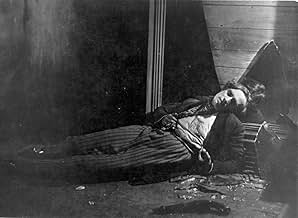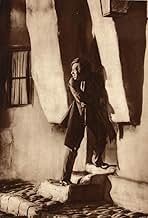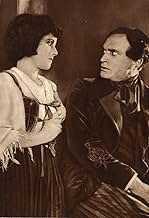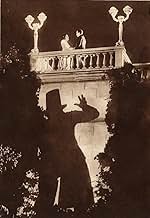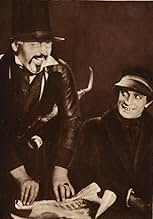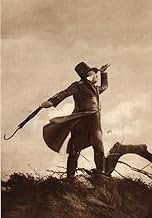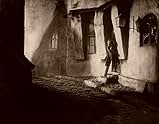For Balduin, going out to beer parties with his fellow students and fighting out disputes at the tip of the sword have lost their charms. He wants to find love; but how would he, a penniless... Read allFor Balduin, going out to beer parties with his fellow students and fighting out disputes at the tip of the sword have lost their charms. He wants to find love; but how would he, a penniless student, ever dare looking up to any woman worth of loving? Absorbed in his dreary though... Read allFor Balduin, going out to beer parties with his fellow students and fighting out disputes at the tip of the sword have lost their charms. He wants to find love; but how would he, a penniless student, ever dare looking up to any woman worth of loving? Absorbed in his dreary thoughts and indifferent to the advances of Lyduschka, Balduin is unexpectedly offered a fortune... Read all
- Director
- Writers
- Stars
- Liduschka, Blumenmädchen
- (as Elizza la Porta)
- Comtesse Margit, seine Tochter
- (as Agnes Esterhazy)
- Director
- Writers
- All cast & crew
- Production, box office & more at IMDbPro
Featured reviews
'The Student of Prague' deserves a lot more credit than it gets at the moment. It is not one of my favourites and is not quite perfect, but there are so many good, brilliant even, things that made 'The Student of Prague' a very memorable experience for me. Not quite among the best of my recent first time viewings, but one of the most interesting and most unique because of its visuals and atmosphere. Anybody who hasn't seen it yet and has an interest to, definitely do so.
Don't know where to start with the praise, but will start with the visuals. Visually and technically, 'The Student of Prague' is another silent film to be a triumph. The sets are elaborate and hauntingly expressionistic, the effects are generally remarkably accomplished (occasionally showing their age though) and the lighting has a real eeriness, but the standout is for me some of the best cinematography for any film of the late 20s. It is the complete opposite of static and is actually wildly imaginative. Making for some memorable images, like Scapanelli on the mountaintop, the snatching of the love letter with great use of shadow and the rescue scene. The music may not be one of the most inspired or memorable music scores in the world, but it at least is not discordant with what happens and has an unsettlement.
Although the story is imperfect in terms of pacing, it just captivates atmosphere-wise. There is a genuine creepiness and the confrontations leaves one glued to the edge of the seat. The dramatic highlight is the final confrontation, which is nothing short of hair-raising. Both Balduin and especially Scapinelli are fascinating characters and the chemistry between Balduin and the reflection is immediately intriguing and stays that way throughout. Veidt is very dashing and charismatic but also chilling when necessary. Werner Krauss is every bit as good and while he has fun as Scapinelli he also sends shivers down the spine. The film is superbly directed, especially in the final confrontation.
It's not perfect but actually doesn't have an awful lot wrong with it. It's flawed pace-wise, with some draggy scenes. Such as a party scene that is overlong and adds nothing.
Elizza La Porta is charming enough but her character isn't as meaty and she doesn't have the same amount of charisma that Veidt and Krauss do. As a few have said, the print is pretty shoddy but not enough to render 'The Student of Prague' unwatchable.
On the whole, very good and deserves more credit. 8/10
The plot is a combination of FAUST and Poe's WILLIAM WILSON. Conrad Veidt plays Baldwin, a poor student who falls in love with an upper class girl but doesn't have the money to woo her. He makes a deal with the Devil for wealth but at an unexpected cost. Satan takes Baldwin's mirror reflection as payment. The doppelganger does bad things that the student is blamed for. This leads to a final confrontation. The Devil is played by Veidt's CABINET OF DR CALIGARI co-star Werner Krauss. His appearances are brief, but unforgettable. Elizza La Porta portrays the flower girl whom Baldwin rejects. Director Henrik Galeen, who wrote two other German supernatural classics, NOSFERATU and THE GOLEM, shows that he was just as capable behind the camera.
Like most important films from the Weimar Era, STUDENT is divided into acts as if it were a stage play. There are 7 acts of which two, Acts 3 and 6, linger in the memory long after the movie ends. In Act 3 Baldwin makes his deal with the Devil. The endless stream of money coming from a small coin purse until it overflows the table followed by Baldwin's reflection walking out of the mirror as he stands motionless, is mesmerizing. Act 6 takes place in a tavern where Baldwin has gone after being abandoned by his his friends. He buys drinks for everyone, and they start dancing. Slowly at first, then things get wilder and more diabolical as Baldwin comes to realize that his life is no longer his own and he has no control over what will happen to him next. The tavern scene is my favorite in the movie.
This restoration was done in 1999 and, while not perfect, at least gives us the opportunity to view the complete film in a pretty good condition. The source material was derived from two prints, one from Uruguay, the other from Moscow film archives. The print has been tinted but is oversaturated in places (which can be corrected by decreasing the color on your TV) and comes with a newly composed score from Stephen Horne which was done in 2016. The scoring of the Act 6 party scene is one of the most effective I have ever heard. Although the DVD comes from Germany, it's an all-Region release which means it plays on Region One DVD players without any issues. Hopefully a fully restored Blu-ray edition, including Horne's music, will be ready for the film's 100th anniversary in 2026... For more reviews visit The Capsule Critic.
** 1/2 (out of 4)
German horror/drama is a remake of the 1914 version, which was the first German horror film. A poor college student (Conrad Veidt) falls in love with a rich girl but knows he'll never get her due to his poorness. Then enters Scapinelli (Werner Krauss), a strange man who offers the student 600,000 gold pieces in return for something from the students room. The student agrees but is shocked when the man takes his soul. Outside the good performances by Veidt and Krauss, this film really doesn't add too much that the 1914 film didn't do better. This film here runs fifty-minutes longer but the tiresome pace doesn't help matters and even the special effects were better done in the previous version.
A mephistophelian character named Scarpinetti offers to deliver on that, and in one scene dramatically stands atop a windy hill by a fallen tree gesturing towards a hunting party. They seem to follow his directions, which leads to a rich heiress having trouble with her horse near Balduin, who rescues her.
However, this is just a tease from Scarpinetti. Balduin goes to visit the woman later, taking with him a flower from a poor flower girl (who seems sweet on him). He fidgets with the flower behind his back, and seems to be contemplating giving it to the rich woman, when her fiancé's large flower arrangement arrives. Balduin realizes he needs money to woo this woman (forgetting, seemingly, that he'd wanted a rich woman for money in the first place anyway).
He makes a deal with Scarpinetti: 600,000 pieces of gold (! - error in the intertitle, maybe?) and Scarpinetti gets to take anything he wishes from Balduin's room. He manages to take Balduin's mirror reflection, and while that would seem to be the end of the deal, Scarpinetti still influences events in Balduin's life.
There are some striking scenes in the movie, and some scenes that really drag. One that goes on for a long time is a party after someone had died, and there doesn't seem to be much purpose to it, or at least for it to have been so long.
Balduin's mirror reflection doppelganger doesn't show up much, but figures in more towards the end, which is pretty satisfactory. I'm curious to see the other adaptations of this story now as well.
Did you know
- TriviaElizza La Porta's debut.
- Alternate versionsVersion restored in 1999 for the Munich Film Archive based on a copy with Spanish intertitles from the Archivo Nacional de la Imagen y la Palabra - Sodre in Montevideo that was secured by L'Immagine Ritrovata, Bologna, and a German copy secured by Gosfilmofond, Moskow. The version has been re-tinted, with the tinting only partially matching that of the Spanish copy. Music by Stephen Horne, sound Orpheus Studio, London. Runtime 2 hours 13 minutes.
- ConnectionsEdited into Histoire(s) du cinéma: Le contrôle de l'univers (1999)
- How long is The Student of Prague?Powered by Alexa
Details
- Release date
- Country of origin
- Language
- Also known as
- The Student of Prague
- Production company
- See more company credits at IMDbPro
- Runtime1 hour 50 minutes
- Sound mix
- Aspect ratio
- 1.33 : 1
Contribute to this page


